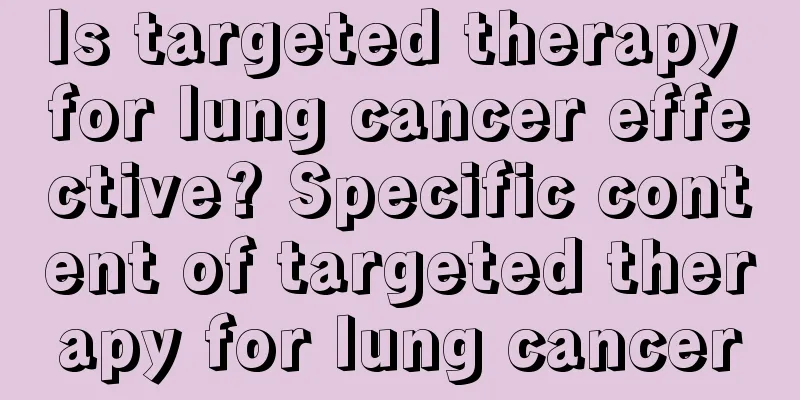Can rectal cancer be cured in its early stages? What are the causes of rectal cancer?

|
Rectal cancer is one of the common malignant tumors in the digestive tract. These tumors may penetrate deep into the pelvic cavity. The surgical treatment process will be difficult, and the recurrence rate after surgery is often high. Therefore, prevention should be done in normal times to avoid gastrointestinal lesions. In the protection stage, effective prevention work should be carried out according to different reasons. What causes rectal cancer? What are the symptoms of rectal cancer? What are the causes of rectal cancer? The cause of rectal cancer is the same as that of colon cancer. It is not very clear at present. In some special areas, such as the Yangtze River Basin, rectal cancer is related to schistosomiasis, but this cause is becoming less and less common. In recent years, the number of patients with inflammatory bowel disease has increased. Chronic inflammation may lead to cancer, but rectal cancer is mainly caused by lifestyle and gene mutation. What are the symptoms of rectal cancer? Typical symptoms of rectal cancer are bloody stools, changes in bowel habits, and alternating diarrhea and constipation. When the tumor grows larger, some patients will have a feeling of tenesmus, which becomes increasingly obvious. If the tumor continues to grow, pain will occur around and inside the anus, eventually leading to inability to defecate, abdominal distension and pain, and symptoms of intestinal obstruction. Can rectal cancer be cured in its early stages? Early rectal cancer can be cured, and the cure rate varies at different stages. The cure rate for stage I rectal cancer is about 90%, similar to colon cancer; the cure rate for stage II is 70% to 80%; and the cure rate for stage III is 55% to 75%. The number of radiotherapy sessions for rectal cancer depends on the condition. Currently, there are two major radiotherapy modes in the world: short-term and long-term. Short-term radiotherapy is 5 days, and long-term synchronous chemoradiotherapy usually requires 25 sessions. If radiotherapy is performed from Monday to Friday every week, it will take 5 weeks. |
<<: What tests are needed if rectal cancer is suspected? 4 tests to screen for rectal cancer
Recommend
What fruits are good for late-stage cervical cancer?
Patients with cervical cancer should eat more fru...
What is the best way to treat fibroids
What is the best way to treat fibroids? With the ...
What is the more scientific nursing method after bladder cancer surgery
Everyone wants to have a healthy body, but there ...
How long can you live after surgical resection of advanced liver cancer
How long can you live after surgical resection of...
What causes brain cancer
What causes brain cancer? As our living environme...
Two key points to distinguish colon cancer from enteritis
I am 50 years old. I started to have pain in my a...
What should I do if I suddenly have cerebral thrombosis? Do these things well
Cerebral thrombosis is a common cerebrovascular d...
Sequelae of chemotherapy for nasopharyngeal carcinoma
Chemotherapy is an effective method for treating ...
What foods are good for sleep?
Good sleep quality is crucial for everyone. If a ...
Who decides the skin color of a child
A child's skin color is not necessarily deter...
How to make your hair look fluffy
If you want to make your hair fluffy and layered,...
Is a hard bed good for the lumbar spine?
Is a hard bed good for the lumbar spine? If you h...
How to stop breastfeeding quickly
After children start eating and weaning, mothers ...
What can be added to milk powder to prevent getting a sore throat
Many babies will suffer from getting a sore throa...
What are the early symptoms of osteosarcoma
In the early stages of osteosarcoma, there will b...









